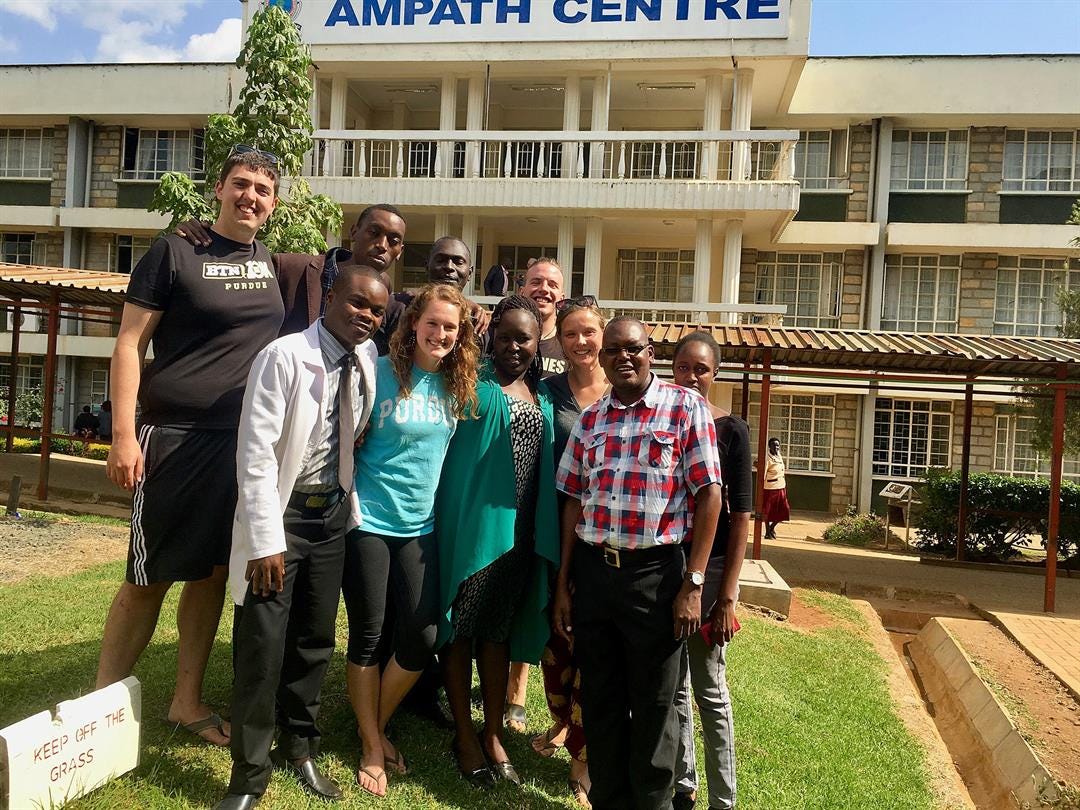Purdue Alum Creates Bandages to Save Lives in Kenya
 Mills says more than 500 of the modified bandage kits have been distributed in Kenya.
Mills says more than 500 of the modified bandage kits have been distributed in Kenya.
Subscriber Benefit
As a subscriber you can listen to articles at work, in the car, or while you work out. Subscribe NowA skin infection called Kaposi Sarcoma—easily treated in the U.S.—claims about one million lives each year in Kenya. The situation puzzled a Purdue University pharmacy alum and motivated him to create a medicated bandage that is now being used in the African nation. Alex Mills traveled to Kenya for his student service-learning project in 2016 and discovered socioeconomic barriers were the main culprits blocking treatment of the infection; his $2 solution is now helping hundreds of patients.
“As a pharmacist and healthcare professional, I think about how I can provide care realistically and in a cost-effective way,” says Mills, who earned his PharmD in 2017. “I think that’s easily lost in our profession of, ‘This is what we’re supposed to use.’ But when a patient can’t meet us at that point because of cost, lack of resources or any other socioeconomic barriers, it was rewarding [in Kenya] to figure out what can I do with what the patient has.”
Kaposi Sarcoma is one of HIV/AIDS’ most opportunistic infections, meaning it takes advantage of the weakened immune system caused by the disease. Due to the HIV/AIDS epidemic in Kenya, the otherwise treatable skin condition causes more than one million deaths annually. It also produces unsightly wounds—typically on the legs or arms—and carries a heavy social stigma.
“Patients have these wounds on their legs and people say, ‘Hey, there’s something wrong with you,’” says Mills. “That further magnifies a lot of the social barriers an individual can have because of this unsightly illness that can develop. That was my focus; that’s why I wanted to address it.”
More than skin lesions, Kaposi Sarcoma is a cancer that can spiral out of control, spread to other organs and make patients susceptible to other infections. In the U.S., commercially-available compression bandage kits cost about $15 to $30 and easily heal the wounds, but are an unrealistic solution in Kenya; namely, they’re too expensive for the low-resource setting. The bandage resembles a knee-high compression sock, and the material is coated in a medicated paste.
“I took all of the individual parts that comprise the kit and thought, ‘What do I have here in Kenya with very limited resources? How can I get all of those individual components, and essentially, experiment and try to develop my own version of that kit?’” says Mills. “I remember spending time at the cafeteria in our compound in the middle of the night with some bandages out on the kitchen table, some medicated paste, and I have a butter knife that I’m using to spread it over this bandage—hoping it was going to work.”
Mills successfully duplicated the commercially-available kit. His version includes the same two key components: compression and the active ingredient. He says the most important distinction is that the bandage is a sustainable solution in Kenya; rather than forcing the region to rely on donations or funding to purchase commercially available bandages, they’re produced by hand in Kenya using available materials.
Mills says clinics throughout Kenya associated with Purdue’s efforts are now using the bandages, and team members are aiming to make them available in Tanzania. Current efforts center on conducting clinical research that could show the benefits of using the bandages. The team is also looking for partners and funding that could ramp up production and standardize manufacturing of the bandage kits.
Mills is now completing a residency at the University of Mississippi School of Pharmacy to specialize in ambulatory care. While wound care likely won’t be the focus of Mills’ career moving forward, he says lessons learned in Kenya will guide how he cares for patients.
“Caring for patients here in Mississippi—they have similar barriers, especially in their socioeconomic status,” says Mills. “Thinking about what my patients need and what gaps are out there in their care—that’s always in the forefront of my mind.”
Mills says his bandage kit is a modified version of the commercially-available Unna Boot, but features the same key elements.
Mills says producing the bandage kits in Kenya is a long-term solution that could also stimulate the local economy.
